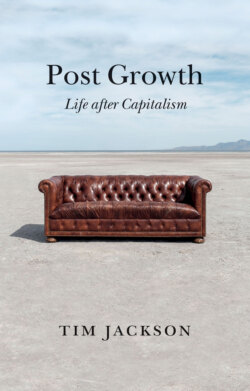Читать книгу Post Growth - Tim Jackson - Страница 18
2 Who Killed Capitalism?
Оглавление‘As a capitalist, I believe it’s time to say out loud what we all know to be true: Capitalism, as we know it, is dead.’
Marc Benioff, 20191
‘Shamed, dishonoured, wading in blood and dripping with filth, thus capitalist society stands.’
Rosa Luxemburg, 19152
In a curious incident, during the run-up to the 2016 Brexit Referendum in the UK, a British academic was trying to persuade a public meeting of the dangers awaiting the country if it cast itself adrift from membership of the European Union. The impact on the GDP would dwarf any savings the UK might make from its budget contributions to the EU, the expert told the crowd. ‘That’s your bloody GDP!’ shouted a woman in the audience. ‘It’s not ours!’3
Behind this angry remark lay a host of uncomfortable truths. That almost a decade after the financial crisis, economic growth had failed to return to its pre-crisis trend. That successive years of austerity had made the lives of the poorest harsher. That faith in the expertise of economists and politicians had been severely eroded along the way. That statistics had become weaponized in the interests of elite minorities. That, in a ‘post-truth’ era, numbers themselves no longer held sway as immutable facts.4
But above all, the anger betrayed an undeniable sense of loss: a loss of faith in the myth of growth. The continual expansion of the economy – growth in the GDP – had been synonymous with the idea of social progress for as long as anyone could remember. But that cosy idea no longer reflected the reality of everyday life for ordinary people in one of the most advanced economies of the world. Beyond the fury of the crowd lay the discernible rumbling of a cultural myth beginning to fall apart.
Strangely, that loss of faith wasn’t just confined to those left behind by the economic system. It has appeared in the most unlikely places. Sometimes at the heart of the establishment. A walk-on part for the postgrowth society was not the only evidence that things were changing in Davos. One of the world’s largest banks chose the 2020 World Economic Forum to hold a week-long series of discussions under the title ‘Is Growth an Illusion?’5
